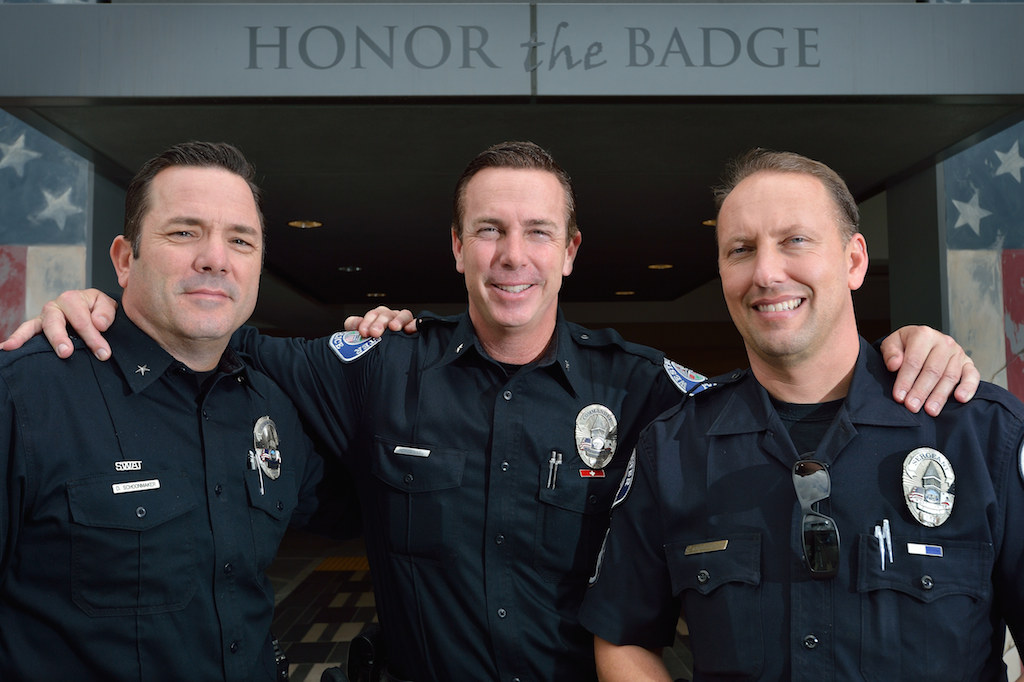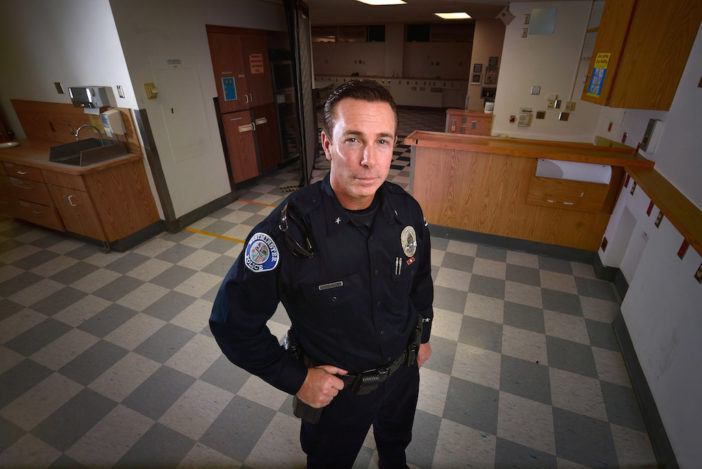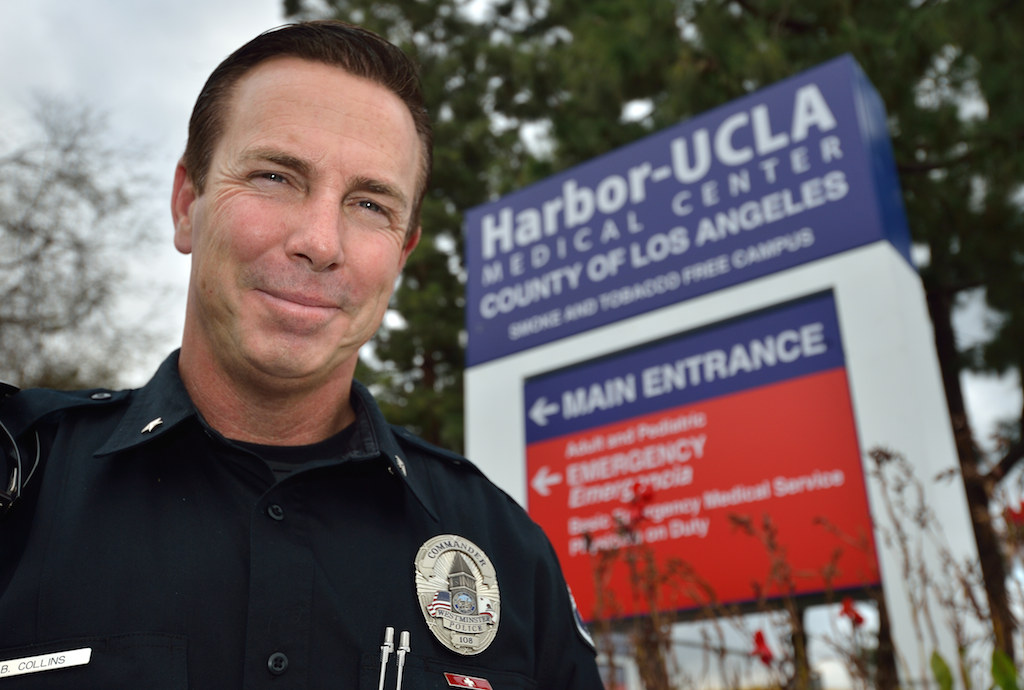Editor’s note: In honor of Behind the Badge OC’s one-year anniversary, we will be sharing the 30 most-read stories. This story originally published Jan. 16.
He remembers the first thing he said to his wife.
“Was I dead?” Bill Collins asked her from his bed in the ICU.
A doctor answered for her:
“Technically, yes, you were dead.”
***
At a police agency filled with physically fit officers, Collins stood out.
A workout and health-food nut, the married father of three young boys had a muscular build at 6 feet 2 inches and 200 pounds.
When word got around the Westminster PD around noon on Jan. 26, 2013 that something bad had happened to Collins — that, at age 44, he had collapsed while watching his son’s jiu jitsu tournament — his colleagues first thought it was a joke.
No way, they thought.
Impossible.
What happened after that could be called just that:
Impossible.
***
On that Saturday morning nearly two years ago, Collins, then a lieutenant, was at Los Angeles Southwest College with his sister, Karen, and her husband.
Collins’ oldest son, Kyle, 12, headed to the floor to compete as he had many times.
Without warning, Collins then collapsed on a bench in the bleachers.
Karen thought he had fainted. When she saw his ashen face and dilated pupils, she knew things were a lot worse.
“He had that look,” Karen recalled. “He was leaving us.”

This photo of Kyle Collins was taken minutes, if not seconds, before his father collapsed. Photo courtesy of Collins family.
Collins, a 23-year Westminster PD veteran, wasn’t breathing.
He didn’t have a pulse.
Karen and others began administering CPR.
Todd Drotning, a father of another competitor, rushed up to the chaotic scene.
“He looked like he was gone – absolutely gone,” Drotning said.
After six to eight minutes of CPR, Collins still didn’t have a pulse.
Believing he was gone, Karen and others were about to stop CPR when an EMT assigned to the tournament retrieved an Automated External Defibrillator from the gym and went to work on Collins.
One shock.
Nothing.
Second shock.
Nothing.
From his spot on the floor, Kyle Collins saw people frantically trying to save his father’s life.
Los Angeles County Sheriff’s Deputy Reginald Ducree, who is assigned to the college, walked up and hugged the boy.
“He looked so scared,” Ducree recalled. “To see his dad like that…He was just devastated. “I told him, ‘Your dad’s going to be all right.’”
Third shock.
Finally, a faint heartbeat.
Paramedics arrived.
Ducree drove ahead of the ambulance, clearing intersections so Collins could get to Harbor-UCLA Medical Center in Torrance as quickly as possible.
The medics thought Collins was a goner.
***
In the ER, Collins began to have severe seizures.
As word spread that something horrible had happened, Collins’ colleagues sprung into action.
Best friend Dan Schoonmaker, a Westminster PD commander who was off duty, drove to Collins’ house a mile-and-a-half away.
“Hey, what are you doing here?” Collins’ wife, Deana, said when she saw her friend pull up.
“There’s been a problem with Bill.”
Shock. Confusion. Fear.
Another friend, Sgt. Cameron Knauerhaze, also arrived at Collins’ home.
“I was a wreck,” recalled Knauerhaze, who was on duty. “And she (Deana Collins) was in shock.”
Knauerhaze drove Deana to Harbor-UCLA.
One of Schoonmaker’s adult sons stayed at the Collins’ home to watch over Connor, 10, and Luke, 7.
At Harbor-UCLA, Collins had seizures for 4 ½ hours.

Collins’ best friend, Dan Schoonmaker (left) couldn’t bear to see Collins in the ER. Sgt. Cameron Knauerhaze hadn’t experienced anything like this in his 18 years as a cop. Photo by Steven Georges/Behind the Badge OC
His respiratory system was beginning to shut down.
He had become septic and pneumonia was setting in.
Knauerhaze elbowed his way into the ER to see his friend and mentor on a ventilator and connected to several tubes as a half-dozen doctors and nurses frantically worked on him.
Schoonmaker didn’t go into the ER. He couldn’t bear to see his best friend in such condition. He waited in the lobby with Deana.
Westminster PD Chief Kevin Baker and other officers soon joined them.
***
Doctors packed Collins on ice and put him in a medically induced coma.
Because he had been deprived of oxygen for up to eight minutes, doctors were concerned about brain activity.
Tests conducted on Collins while he was in a coma indicated he had suffered brain damage.
He also had blood clots in both arms, both legs, his neck and in his lungs – all potentially life threatening.
Reserve Westminster Police Officer Josh Bobko, a physician and SWAT medic, told Baker and others that, based on medical statistics for people who had suffered similar episodes, he feared Collins never would be a police officer again.
He told them that the black-and-white reality of being without a heartbeat for so long would mean that Collins likely would have severe motor skill issues.
After Collins emerged from his coma after six days, doctors ordered an MRI and other tests.
The startling findings:
No signs of brain damage.
Soon, nurses and other hospital personnel were coming by Collins’ bed.
You’re a miracle, they told him.
He was told by a neurologist, “There is a higher power looking out for you.”
***
After 10 days at Harbor-UCLA, Collins spent a week at Orange Coast Memorial Medical Center in Fountain Valley. There, he received treatment for blood clots and received an internal cardiac defibrillator.
During his 17 days in both hospitals, Collins lost nearly 30 pounds.
For months, three to four days a week, Collins had dreams of dying.
But his recovery went well.
His colleagues donated more than 1,600 hours in sick time so Collins could continue collecting a paycheck.
On Oct. 14, 2013, Collins was cleared to return to work full time at the Westminster PD after he passed a series of tests.
He hasn’t had any issues since.
***

The Collins family (from left): Deana, Luke, Kyle, Bill and Conner. Photo courtesy of the Collins family
Schoonmaker still chokes up when talking about almost losing his best friend.
Knauerhaze still is blown away by what happened.
“In 18 years as a cop,” Knauerhaze said, “I thought I had seen everything.”
Knauerhaze added: “This made all of us realize how life is so fragile. You can be working with somebody and then, in a moment, they’re gone.”
The three of them — Collins, Schoonmaker and Knauerhaze — love to razz each other.
“Whenever Collins shows some attitude,” Knauerhaze said recently, “I’ll tell him, ‘I liked you better when you were dead.’”
Joked Schoonmaker, who is the godfather of Collins’ son, Luke: “Now that he’s normal, he’s a jerk again.”
Added Schoonmaker: “Everybody loves Bill – he treats people great. More than anything, Bill cares about people. And that hasn’t changed. That’s what people love about him.”
Collins praised his colleagues and their support during his ordeal. He also commented on how great the City of Westminster treated him and his family during the entire event.
“The men and women of the Westminster Police Department are some of the most caring, giving and kindest people I know,” he said. “I’m truly blessed to work with each and every one of them.”
***
The trauma of seeing his father almost die profoundly affected Kyle.
Despite being very talented, Kyle stopped competing in jiu jitsu tournaments.
For a long time, Collins and Kyle didn’t talk about the experience. It was too emotional for them.
About two months ago, they finally did.
“He told me, as his voice cracked, that when everyone was working on me, he knew I was going to be OK,” Collins said. “He then followed up with confidence in his voice and said, ‘I knew God was going to take care of you.”
Added Collins: “Hearing him say that left me speechless.”
Collins is back to being himself. And he pretty much is doing what he did before he collapsed: eating healthy and spending as much time as possible with his wife and three sons.
***
Why did Collins collapse?
There is no medical reason and no family history to blame.
To this day, doctors cannot explain how he completely recovered from such a grave state.
Collins has an explanation.
“God was not done with me,” he said.
The brush with death strengthened Collins’ faith.
In a phone conversation months after the incident, he told Drotning: “If you ever have doubts about there being a God, don’t, because there is one.”
During the six to eight minutes when he was without a pulse, Collins said he had an experience.
“I was in a great place. It was calm and serene — a place I didn’t want to leave,” he said. “I felt safe — completely safe.
“There was no stress, no conflict, and no anxiety. I felt absolute peace.”
On a recent weekday at Westminster PD headquarters, after his first interview about how he nearly died — or did die, but somehow came back — Collins headed out to his patrol car.
“Because of that experience,” he said, “I have absolutely no fear of dying. I know where I’m going when it’s my time.”
 Behind the Badge
Behind the Badge




